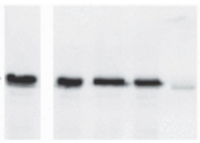1

Anti-OLE2 | Oleosin 21,2 kDa
- Product Info
-
Immunogen: Conjugated peptide, derived from Arabidopsis thaliana oleosin OLE2, UniProt: Q39165, TAIR: At5g40420 Host: Rabbit Clonality: Polyclonal Purity: Total IgG. Protein A purified in PBS, 50% glycerol. Filter sterilized. Format: Liquid at 2 mg/ml. Quantity: 200 µg Storage: Store at -20°C; once reconstituted make aliquots to avoid repeated freeze-thaw cycles. Please remember to spin the tubes briefly prior to opening them to avoid any losses that might occur from material adhering to the cap or sides of the tube. Tested applications: Western blot (WB) Recommended dilution: 1: 10 000 - 1: 20 000 (WB) Expected | apparent MW: 21 | 19 kDa - Reactivity
-
Confirmed reactivity: Arabidopsis thaliana Predicted reactivity: Camelina sativa, Capsella rubella, utrema salsugineum. Raphanus sativus
Species of your interest not listed? Contact usNot reactive in: Glycine max - Application Examples
-

Homogenates of dry seeds of Arabidopsis thaliana wild-type (left panel), oleosin-deficient mutants: ole4, ole3, ole1 and ole2 (from left to right following wild-type) were freshly extracted with 2x SDS-sample buffer (+ 2ME) for SDS-PAGE and denatured with 4X SDS buffer at 95°C for 5 min. were separated on 15 % SDS-PAGE and blotted to PVDF membrane. Blot was blocked with 5 % skim milk/TBS-T, 1h/RT with agitation. Blot was incubated in the primary antibody at a dilution of 1: 2000 in TBS-T for 1h/RT. The antibody solution was decanted and the blot was washed 4 times for 10 min in TBS-T at RT with agitation. Blot was incubated in matching secondary antibody (anti-rabbit IgG horse radish peroxidase conjugated) diluted to 1:10 000 in for 1h/RT with agitation. The blot was washed as above and developed with a chemiluminescent detection reagent, following manufacture's recommendations. - Background
-
Background: Oleosins may have a structural role to stabilize the lipid body during desiccation of the seed by preventing coalescence of the oil. Probably interacts with both lipid and phospholipid moieties of lipid bodies. May also provide recognition signals for specific lipase anchorage in lipolysis during seedling growth. Oleosins also increase the viability of over-wintering oilseeds by preventing abnormal fusion of oil bodies during imbibition in the spring. Cellular localisation: surface of oil bodies. - Product Citations
-
Selected references: Shimada et al. (2008). A novel role for oleosins in freezing tolerance of oilseeds in Arabidopsis thaliana. Plant J. 2008 Sep;55(5):798-809. doi: 10.1111/j.1365-313X.2008.03553.x. - Protocols
-
Agrisera Western Blot protocol and video tutorials
Protocols to work with plant and algal protein extracts
Agrisera Educational Posters Collection - Reviews:
-
Peter MA | 2024-03-01This antibody works very well for our samples. The total proteins from Arabidopsis seedlings are subjected to 15% SDS-PAGE and then detected with this antibody (1:5000). The results shows that this antibody is quite specific and sensitive.



